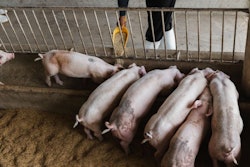
Citing a risk of introducing the African swine fever (ASF) virus, pig farming representatives in the Philippines are opposed to an easing of restrictions on the importation of porcine processed animal protein for aquafeeds.
In the Philippines, farming organizations have expressed opposition to a recent government move to ease restrictions on imports of feed ingredients.
Last week, the government authorized incoming trade in processed animal proteins (PAP) for inclusion in fish feeds. Business World Online reports that the source of these ingredients includes countries affected by ASF. In March, a ban on these products came into effect.
Since ASF was first detected in the country’s pigs in 2019, more than three million hogs have been affected through mortality or culling, according to one farming association. As a result, thousands of pig owners in the Philippines have lost their livelihoods. It says that the department has stated that the ASF virus can be transmitted in feed, and this threatens the recovery of the sector.
In contrast, the easing of import restrictions could provide a much-needed boost to the aquaculture sector, according to that industry’s association. It would also increase access to affordable protein by the Philippine population.
“PAP is a key, irreplaceable ingredient for aquaculture feed, and its production process can be expected to kill the ASF virus,” stated a senior executive with Feedmix Specialist II Inc.
Among the main sources of porcine PAP for aquaculture is Italy, according to the report.
At the start of 2022, ASF was detected for the first time in wild boar on the Italian mainland. Since then, the disease has been confirmed in three Italian regions, almost exclusively among the wild population.
Latest ASF situation in the Philippines
Around the start of August, approximately 100 pigs were culled due to ASF in Norala, reported the Philippine News Agency (PNA). The town is in South Cotabato, a province in the Soccsksargen region in the south of Mindanao.
While all hogs within 500 meters of a confirmed outbreak are culled, the town’s mayor was seeking sources of financial compensation for affected owners.
Meanwhile, the same source reports that ASF has been detected in all seven districts of Zamboanga city, in the northwest of Mindanao.
According to PNA, three regions of the Philippines have remained free of ASF since the disease was first detected in the country in 2019.
Following previous outbreaks and a period of pig depopulation and disinfection, hog raising is allowed to resume in a controlled manner.
Over the past two weeks, PNA reports, around 250 former owners in Central Luzon have each received three young pigs, along with essential feed. These animals will be closely monitored as they serve as sentinels in case of any lingering disease risk. Recipients were warned against feeding their pigs on food waste, which carries the risk of ASF virus contamination.
ASF detected in 10th Indian state
At the end of July, presence of the ASF virus was confirmed in Uttar Pradesh. Located in northern India, this state borders Uttarakhand and Bihar, where recent cases of ASF have also been detected. This brings to 10 the number of Indian territories where the disease has broken out this year.
In response to confirmation of the infection after 20 animals died, all pig and pork markets in the Bareilly district were banned, reported Hindustan Times.
The same measures were already put in place in Uttar Pradesh’s largest city, Lucknow, reported India TV News.
In the far southwest of India, ASF has been detected in a second district in the state of Kerala.
Almost 1,000 pigs have been culled because of the disease in Wayanad and now also Kannur district, according to Deccan Herald.
Meanwhile, the state government is considering procuring pigs from farmers in the area in a bid to stabilize the market and price of pork. Timing for such a move is key as the Onam harvest festival celebrated in Kerala starts at the end of this month.
ASF suspected in two more Indian states
ASF is suspected as the cause of sudden mortality in around 100 pigs in the Ranchi district of Jharkhand. The animals died a week ago in this state in the east of the country, according to Telegraph India. Among those affected were around 70 animals that died out of more than 1,000 at a government pig breeding center in Kanke.
In the northwestern state of Punjab, 200 pigs were recently found dead in the city of Patiala. Tribune India reported that the cause of death was unknown.
This year, local media in India reported cases of ASF in the northeast Indian state of Sikkim.
Last week, details of these outbreaks were officially notified by the national veterinary authority to World Organisation for Animal Health (WOAH).
According to the latest report, ASF outbreaks occurred in 11 backyard pig herds in various parts of the state in the period March 3 to April 3. Affecting a total of 80 pigs, each herd comprised between two and 25 animals.
Since the first cases in Sikkim in January 2020, 47 outbreaks in the state have been registered with WOAH. Directly impacted have been more than 21,920 pigs, of which around 6,000 died.
Further cases in domestic pigs in Nepal, Thailand
In northeastern Thailand, ASF has been detected for the first time in Nakhon Ratchasima. Affected was a village herd of 40 pigs in the province at the end of June, according to the latest notification to WOAH.
Since the country’s first cases in November 2021, outbreaks have been confirmed in 32 of the 76 provinces, and all six regions. These have involved around 2,900 pigs, all in village herds, according to the official reports.
In the Central region of Nepal, presence of the ASF virus was confirmed at a small farm in Bagmati province at the end of July. Based on WOAH notifications, this brought the nation’s total outbreaks since March to 17. Directly impacted have been 6,543 pigs.
Update on ASF in Indonesia, Vietnam
As many as 122,000 pigs have died from ASF in Indonesia’s East Nusa Tenggara.
In this province in the east of the country, the disease has spread to 22 districts and cities, reported Antara News at the end of July. As well as the mortalities, pig owners have borne heavy financial losses.
According to the local livestock officer, the provincial government has taken action to control ASF. Measures included an awareness campaign developed by a joint scheme involving Australia and Indonesia. This focused on the importance of farm hygiene and additional care over pig movements. Transport of the animals out of the province has been banned.
As of July, there have been no reports of pig deaths, the official said.
In Vietnam, ASF has been detected in 14 provinces so far this year. This is according to the United Nations’ Food and Agriculture Organization (as of July 24).
ASF situation elsewhere in Asia
Over the period June 1 to July 6, eight wild pigs tested positive for the ASF virus in Western Malaysia.
According to this latest report to WOAH from this region, the animals were found at seven locations in the states of Terengganu, Kelantan, and Pahang.
While a recent WOAH notification states there have been no new ASF cases in the state of Sabah in Eastern Malaysia, The Borneo Post reports suspicions of the disease at a farm. It is in the Serian district of neighboring Sarawak.
The local minister responsible stated the ASF situation in the area is under control.
Number of confirmed ASF cases in South Korea’s wild boar population stands at 2,652, according to Pig People (as of August 8). This is an increase of four from the previous update dated July 22. The disease was first confirmed in the country in September 2019.
In Hong Kong, the ASF situation has been reported as “resolved.” The territory’s veterinary authority made this declaration to WOAH after the detection of ASF in one wild pig at the end of May.
According to the report, no further cases have occurred since that time. However, monitoring of wild pig mortalities and pig farms in Hong Kong by the agriculture department are set to continue.
View our continuing coverage of the global African swine fever situation.

















